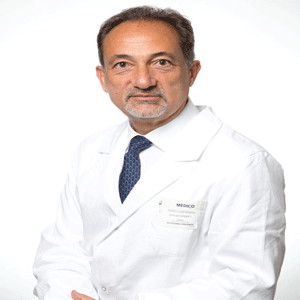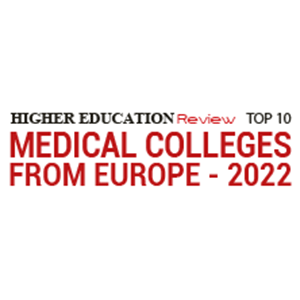Campus Bio-Medico University of Rome: A Global Cradle Of Medical Education
By Professor Vincenzo Di Lazzaro, Dean of the Faculty of Medicine and Surgery DTMU Dean
The healthcare industry is continuously evolving, technologies considered best practices today can change drastically in just the span of a decade. That’s why care providers have to regularly keep up with new techniques and technologies and expand their knowledge and skills – which means continuous education is not a nice to have but an absolute necessity for any healthcare professional who wants to provide high-quality patient care.
Founded in the latter half of the 1980s, the Campus Bio-Medico University of Rome aims at offering a valid human and professional training path and meet people’s needs, guided by a humancentred spirit of service by promoting a high-quality, human-centred approach to education, research, and the provision of healthcare.
The University began operations in 1993 with an MD and a Nursing degree, and graduate medical education programmes were introduced in 2001. A new Department of Science and Technology for Humans and the Environment was founded in 2019 and joined the Department of Engineering, which had been established in 1999.
The University currently provides 14 undergraduate and graduate courses throughout itsthree main departments, along with 26 residency programmes in a variety of medical and surgical specialties and subspecialties, taught by a total of 178 professors. A new 357-bed hospital (Campus Bio-Medico University Hospital Foundation), which received JCI certification in 2020, is located on the campus in addition to administrative, educational, and research (53 Research Units, 20+ Laboratories) facilities.
The educational experience at the University is designed to stimulate its students' cultural, professional, and human growth by fostering a spirit of service and an interdisciplinary approach focused on the well-being of individuals and communities. “In order to prepare our students for the challenges of healthcare delivery worldwide we have launched two new MD courses in English. The first is the traditional MD program. Second is our newly created MD program with its focus on engineering (MedTech) was launched together with a new Bachelor's Degree Program in Biomedical Engineering in English.
with the opportunity for the MedTech students to attend joint courses on engineering areas and also achieve a double degree in Medicine and in Biomedical Engineering, which is an example of our future roadmap that will focus on interprofessional and interdisciplinary education and research”, explains Professor Vincenzo Di Lazzaro, Dean of the Faculty of Medicine and Surgery.
A tutor is accessible to all students in each class to assist the professor. Additionally, each student receives oneon- one coaching and/or advice throughout their academic career. Instead of directly presenting facts and concepts to students, the teaching strategies place a strong emphasis on Problem-Based Learning (PBL), which uses challenging real-world issues as a vehicle to encourage students to understand theoretical concepts and principles. Numerous fundamental abilities that are crucial for medical professionals, such as communication, problem-solving, and critical thinking, are developed in students.
International students who want to study in Italy can take the Foundation Year Programme at the Campus Bio Medico University of Rome. The program's objectives are to close any educational gaps, get students ready for the entrance exams for nursing and medicine, and enhance their Italian and English language skills. Additionally, the office for international students supports students both on and off campus as they adjust to their new lives in Rome.
Throughout their curriculum, students are highly encouraged to engage in active research by contacting and communicating with faculty members. To graduate, all students must successfully complete a thesis. The fundamentals of research design and implementation, as well as a critical examination of the literature, are covered through lectures, practice sessions, and internships that are all fully integrated into the MD curriculum. The university has strategic partnerships for visiting lecturers with internationally renowned universities like UC Berkeley, the University of Pennsylvania, Boston Children's Hospital, and others. Italy has much lower healthcare education costs than many other nations, particularly English-speaking nations.
The cost of the MD English programme for overseas students is currently 18,000 Euros per year. For international students, there are a number of scholarships that can pay for their tuition (wholly or partially). To help eligible students who need financial assistance, the university offers scholarships and financial aid in partnership with the Lazio Region, and industries. Scholarships are available and are given out based on both merit and financial need (covering up to 50 percent of tuition).
Two multipurpose educational buildings (Cu. Bo and TRAPEZIO) featuring cutting-edge lecture halls, small group study areas, meeting rooms, and educational and IT laboratories are located on the Campus Bio-Medico University of Rome campus. The Cultural Box (Cu. Bo) building houses a massive state-of-the-art simulation centre. A library that gives students access to both actual and digital instructional resources is located in the TRAPEZIO building.
The campus offers students accommodation, recreational areas, and activities in addition to educational and research resources. The Hospital is also accredited as an Academic Medical Centre by the Joint Commission International, a private, international agency that monitors adherence to high standards in the healthcare industry.
Vincenzo Di Lazzaro, is Professor of Neurology, Medical Director for Clinical Neurology, Director for the Neurology Residency Program and Dean of Campus Bio-Medico Medical School. He is Past President of Italian Society of Clinical Neurophysiology. Vincenzo Di Lazzaro received his M.D. in 1986 and his residency in Neurology in 1990, both from Università Cattolica del Sacro Cuore in Rome, Italy. He joined Campus Bio-Medico Medical School in 2012. His clinical focus is the care of patients with dementia, stroke, Parkinson disease and other neurodegenerative disorders.
Founded in the latter half of the 1980s, the Campus Bio-Medico University of Rome aims at offering a valid human and professional training path and meet people’s needs, guided by a humancentred spirit of service by promoting a high-quality, human-centred approach to education, research, and the provision of healthcare.
The University began operations in 1993 with an MD and a Nursing degree, and graduate medical education programmes were introduced in 2001. A new Department of Science and Technology for Humans and the Environment was founded in 2019 and joined the Department of Engineering, which had been established in 1999.
The University currently provides 14 undergraduate and graduate courses throughout itsthree main departments, along with 26 residency programmes in a variety of medical and surgical specialties and subspecialties, taught by a total of 178 professors. A new 357-bed hospital (Campus Bio-Medico University Hospital Foundation), which received JCI certification in 2020, is located on the campus in addition to administrative, educational, and research (53 Research Units, 20+ Laboratories) facilities.
Industry Oriented Tailor Made Programs
The educational experience at the University is designed to stimulate its students' cultural, professional, and human growth by fostering a spirit of service and an interdisciplinary approach focused on the well-being of individuals and communities. “In order to prepare our students for the challenges of healthcare delivery worldwide we have launched two new MD courses in English. The first is the traditional MD program. Second is our newly created MD program with its focus on engineering (MedTech) was launched together with a new Bachelor's Degree Program in Biomedical Engineering in English.
with the opportunity for the MedTech students to attend joint courses on engineering areas and also achieve a double degree in Medicine and in Biomedical Engineering, which is an example of our future roadmap that will focus on interprofessional and interdisciplinary education and research”, explains Professor Vincenzo Di Lazzaro, Dean of the Faculty of Medicine and Surgery.
A tutor is accessible to all students in each class to assist the professor. Additionally, each student receives oneon- one coaching and/or advice throughout their academic career. Instead of directly presenting facts and concepts to students, the teaching strategies place a strong emphasis on Problem-Based Learning (PBL), which uses challenging real-world issues as a vehicle to encourage students to understand theoretical concepts and principles. Numerous fundamental abilities that are crucial for medical professionals, such as communication, problem-solving, and critical thinking, are developed in students.
International students who want to study in Italy can take the Foundation Year Programme at the Campus Bio Medico University of Rome. The program's objectives are to close any educational gaps, get students ready for the entrance exams for nursing and medicine, and enhance their Italian and English language skills. Additionally, the office for international students supports students both on and off campus as they adjust to their new lives in Rome.
Research, Scholarship & the Infrastructure
Throughout their curriculum, students are highly encouraged to engage in active research by contacting and communicating with faculty members. To graduate, all students must successfully complete a thesis. The fundamentals of research design and implementation, as well as a critical examination of the literature, are covered through lectures, practice sessions, and internships that are all fully integrated into the MD curriculum. The university has strategic partnerships for visiting lecturers with internationally renowned universities like UC Berkeley, the University of Pennsylvania, Boston Children's Hospital, and others. Italy has much lower healthcare education costs than many other nations, particularly English-speaking nations.
The cost of the MD English programme for overseas students is currently 18,000 Euros per year. For international students, there are a number of scholarships that can pay for their tuition (wholly or partially). To help eligible students who need financial assistance, the university offers scholarships and financial aid in partnership with the Lazio Region, and industries. Scholarships are available and are given out based on both merit and financial need (covering up to 50 percent of tuition).
Two multipurpose educational buildings (Cu. Bo and TRAPEZIO) featuring cutting-edge lecture halls, small group study areas, meeting rooms, and educational and IT laboratories are located on the Campus Bio-Medico University of Rome campus. The Cultural Box (Cu. Bo) building houses a massive state-of-the-art simulation centre. A library that gives students access to both actual and digital instructional resources is located in the TRAPEZIO building.
The campus offers students accommodation, recreational areas, and activities in addition to educational and research resources. The Hospital is also accredited as an Academic Medical Centre by the Joint Commission International, a private, international agency that monitors adherence to high standards in the healthcare industry.
"Our future roadmap will focus on interprofessional and interdisciplinary education and research"
Professor Vincenzo Di Lazzaro, Dean of the Faculty of Medicine and Surgery DTMU Dean
Vincenzo Di Lazzaro, is Professor of Neurology, Medical Director for Clinical Neurology, Director for the Neurology Residency Program and Dean of Campus Bio-Medico Medical School. He is Past President of Italian Society of Clinical Neurophysiology. Vincenzo Di Lazzaro received his M.D. in 1986 and his residency in Neurology in 1990, both from Università Cattolica del Sacro Cuore in Rome, Italy. He joined Campus Bio-Medico Medical School in 2012. His clinical focus is the care of patients with dementia, stroke, Parkinson disease and other neurodegenerative disorders.



